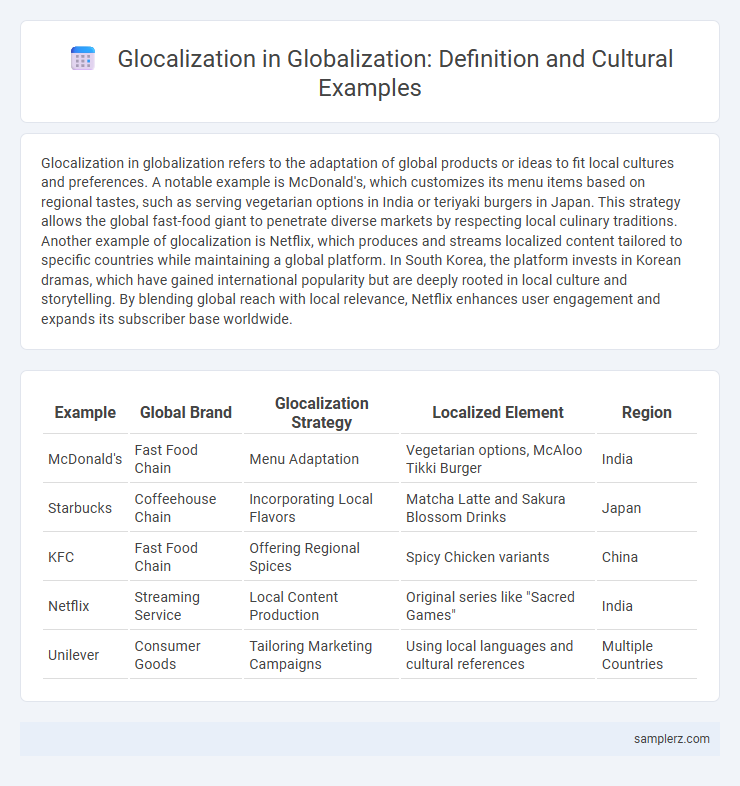Glocalization in globalization refers to the adaptation of global products or ideas to fit local cultures and preferences. A notable example is McDonald's, which customizes its menu items based on regional tastes, such as serving vegetarian options in India or teriyaki burgers in Japan. This strategy allows the global fast-food giant to penetrate diverse markets by respecting local culinary traditions. Another example of glocalization is Netflix, which produces and streams localized content tailored to specific countries while maintaining a global platform. In South Korea, the platform invests in Korean dramas, which have gained international popularity but are deeply rooted in local culture and storytelling. By blending global reach with local relevance, Netflix enhances user engagement and expands its subscriber base worldwide.
Table of Comparison
| Example | Global Brand | Glocalization Strategy | Localized Element | Region |
|---|---|---|---|---|
| McDonald's | Fast Food Chain | Menu Adaptation | Vegetarian options, McAloo Tikki Burger | India |
| Starbucks | Coffeehouse Chain | Incorporating Local Flavors | Matcha Latte and Sakura Blossom Drinks | Japan |
| KFC | Fast Food Chain | Offering Regional Spices | Spicy Chicken variants | China |
| Netflix | Streaming Service | Local Content Production | Original series like "Sacred Games" | India |
| Unilever | Consumer Goods | Tailoring Marketing Campaigns | Using local languages and cultural references | Multiple Countries |
Defining Glocalization: Merging Global and Local Cultures
Glocalization exemplifies the blending of global and local cultures by adapting international products and ideas to fit local customs, preferences, and traditions. This concept is evident in the way multinational corporations tailor marketing strategies and product offerings to resonate with regional cultural identities. By merging global reach with local relevance, glocalization fosters cultural exchange while preserving unique community characteristics.
The Role of Glocalization in Shaping Modern Culture
Glocalization shapes modern culture by blending global influences with local traditions, creating unique cultural expressions such as Korean pop music incorporating Western beats while maintaining Korean language and themes. This cultural hybridization drives consumer behavior, as global brands like McDonald's tailor menus to regional tastes, reflecting localized preferences within a global framework. The dynamic interplay between global connectivity and local identity sustains cultural diversity and innovation in an increasingly interconnected world.
Food Innovations: Global Brands with Local Flavors
Global brands like McDonald's exemplify glocalization by adapting menus to reflect local tastes, such as offering McSpicy Paneer in India or Teriyaki Burgers in Japan. These food innovations blend global brand identity with regional culinary preferences, enhancing cultural acceptance and customer engagement. This strategy drives market penetration while celebrating diverse food traditions within the framework of globalization.
Fashion Fusion: Localizing Global Style Trends
Fashion fusion exemplifies glocalization by blending international style trends with traditional cultural elements, creating unique apparel that resonates locally while appealing globally. In Japan, designers incorporate streetwear influences with kimono fabrics, producing contemporary outfits that honor heritage and modernity. This localized adaptation of global fashion enables cultural preservation alongside international market relevance.
Media and Entertainment: Adapting Content for Regional Audiences
Media giants like Netflix and Disney exemplify glocalization by tailoring content to regional cultures, languages, and preferences, enhancing global reach while respecting local identities. Netflix invests heavily in producing original series in diverse markets such as India, Korea, and Latin America, blending global storytelling with cultural nuances. This strategy not only boosts subscriber growth but also fosters cultural exchange and inclusivity in the entertainment industry.
Technology Adoption: Local Solutions for Global Challenges
Technology adoption in glocalization exemplifies how multinational companies tailor digital tools to fit local needs while addressing global challenges. For instance, mobile banking platforms developed in East Africa integrate local languages and banking habits to enhance financial inclusion across diverse populations. These localized technological solutions accelerate global connectivity and problem-solving by leveraging cultural insights and regional infrastructure.
Retail and Consumer Goods: Customizing Global Products
Retail giants like McDonald's adapt their menus to local tastes by offering items such as the McSpicy Paneer in India, exemplifying glocalization in consumer goods. Customized packaging and marketing strategies further cater to regional preferences, enhancing brand relevance in diverse markets. This approach enables global retailers to maintain a consistent brand identity while respecting local cultural nuances.
Cultural Festivals: Hybrid Celebrations in a Globalized World
Cultural festivals like Japan's Cherry Blossom Festival in the United States exemplify glocalization by blending traditional Japanese customs with American cultural elements, creating hybrid celebrations that resonate locally and globally. These events showcase how global influences adapt to local traditions, fostering cross-cultural understanding and tourism growth. Such hybrid festivals exemplify the dynamic interplay between globalization and cultural preservation.
Education Systems: Integrating Global Standards with Local Values
Education systems exemplify glocalization by blending internationally recognized curricula, such as the International Baccalaureate (IB) or Cambridge programs, with local cultural values and traditions. Schools incorporate local history, languages, and social norms into global educational frameworks, ensuring relevance and cultural preservation. This integration promotes global competencies while respecting community identities and fostering inclusive learning environments.
Tourism Experiences: Balancing Authenticity and Global Appeal
Tourism experiences exemplify glocalization by blending authentic local culture with global accessibility, such as traditional festivals adapted to include international tourists while preserving indigenous rituals. Destinations like Kyoto integrate ancient Japanese customs into tours tailored for diverse global audiences, maintaining cultural integrity alongside modern amenities. This balance enhances economic growth and cultural exchange, ensuring local traditions thrive amid worldwide tourism trends.

example of glocalization in globalization Infographic
 samplerz.com
samplerz.com